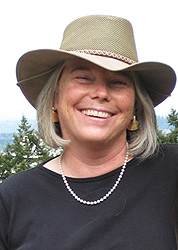Degrees: Ph.D. (Psychology/Physiological
Graduate School: University of California, Los Angeles
Undergraduate School: Concordia University, Montreal, Canada
Current Position: Professor at Michigan State University (MSU) and Associate Director of the Neuroscience Program

To this day, I still think I entered Neuroscience through the back door. Given my previous interest in music therapy, I decided to pursue a degree in Psychology, thinking I would become a clinical psychologist. That decision meant going to graduate school and getting a PhD. The big surprise as an undergraduate psychology major was the more biological classes were the ones I most enjoyed. I especially remember having fun designing a pig that could fly (it was important that their bones be light like those of birds). I also remember being so afraid that I was going to do poorly in my class called "Physiological Psychology" but what I quickly learned is that I was at the top of my class (despite my almost exclusively music background). I was soon invited to join that professor's research lab.
I would like to say that my path was planned after that point, but so much of one's future seems a product of happenstance. I moved across the country to Los Angeles, and needed to find a job. Fortunately, someone at UCLA was looking to hire a lab tech. I was lucky. This lab eventually became the lab where I did my doctoral research. When it came time to apply to graduate school, I still felt torn between whether I wanted to be a clinical psychologist (providing therapy to people), or be a physiological psychologist, which would mean continuing to do brain research. In the end, what made the decision for me was realizing that I was having fun in the lab. Why would I want to walk away from something I was really enjoying? Goodbye clinical psychology; hello neuroscience.
At the core, I am a neuroscientist because I love to figure out how things work. The brain is an exquisite machine, far more complicated than most. So trying to get some insight into the puzzle is fun for me. Also, cells in the brain are strikingly beautiful. They take my breath away. Plus, I like cooking, and doing experiments in the lab often feels like working in my kitchen...specific ingredients combined in a certain way and all of a sudden, something spectacular happens. We begin to understand.
Neuroscience as a discipline is only in its infancy. There is so much to be done before we can really understand how our brain works to cause us to feel sad, or in love, or to experience those "eureka" moments. A particular need is to understand what goes wrong when diseases hit the nervous system. So these days, my research focuses on trying to understand why motoneurons get sick and die in certain neurodegenerative diseases. As you may know, many motoneuron diseases, like amyotrophic lateral sclerosis ("Lou Gehrig disease"), are deadly and have no known cure. I use lots of different tools and levels of analysis in my research: studying behavior, cells and particular gene products within cells. The advent of molecular biology means that many of the genes that cause disease in humans can be expressed in mice, allowing us to study mice to understand human diseases. I also have a long standing interest in how sex hormones (like testosterone) make male and female brains look and function differently. You can learn more about my research and the research of my partner, Dr. Marc Breedlove, at our web site.
I have been a neuroscientist for more than 30 years now and I am still having fun. I think that is amazing. Just imagine finding a career that offers lasting satisfaction and a sense of adventure.
![[email]](./gif/menue.gif)

